The surge in oil production has not benefited California, but that's about to change. Shale oil from North Dakota and other states costs $15 less than imported oil. After transportation costs, California refineries would save $3 per barrel.
"For the past decade, the U.S. shale boom has mostly passed by California, forcing oil refiners in the state to import expensive crude," write Alison Sider and Cassandra Sweet of The Wall Street Journal.
“California refineries arguably have the most expensive crude slate in North America,” says David Hackett, president of energy consulting firm Stillwater Associates.
What's holding up crude-by-rail is a lack of "terminals to unload the oil from tanker cars and transfer it to refineries on site or by pipeline or truck," write Sider and Sweet. However, that's about to change, they write.
- Kern County officials last month gave Alon USA Energy Inc. permission to build the state’s biggest oil-train terminal. That project, which the company hopes to finish next year, is designed to receive 150,000 barrels of oil a day in Bakersfield, Calif., 110 miles north of Los Angeles.
- Plains All American Pipeline LP says it plans to open a 70,000-barrel-a-day oil-train terminal in Bakersfield this month.
- And in northern California, a judge last month dismissed a lawsuit brought by environmental groups that challenged Kinder Morgan Inc.’s rail permits. The company is now receiving oil trains at a Richmond, California, terminal near San Francisco that was built to handle ethanol.
However, the state's lengthy permitting process has taken its toll on the energy companies. "Valero Energy Corp. in March canceled plans to build an oil-train terminal near its Los Angeles refinery. But Valero still hopes to add a terminal to the company’s Benicia, Calif., plant, 35 miles northeast of San Francisco," write Sider and Sweet
Also in the Bay Area, an oil-train terminal in Pittsburg "is on hold after the state attorney general asked for an expanded environmental review," they add.
Finally, the writers point to an indirect means for the state to receiver the cheaper oil from the Midwest—by rail and then barge via Vancouver, Washington.
Even if oil trains are kept off California tracks, more fracked crude still could flow to California. A 360,000-barrel-a-day oil-train terminal in Vancouver, Wash., aims to transfer North Dakota crude from tanker cars to barges that will sail the Columbia River about 100 miles northwest to the Pacific Ocean. From there, it is a quick trip down the coast to California ports.
However, Seattle Post-Intelligencer blogger Joel Connelly writes that Gov. Jay Inslee has yet to approve the controversial project.
The terminal proposal is due to undergo a thorough environmental review by the state Energy Facility Siting Evaluation Council. The final decision on the project is likely to rest with Washington’s “green” Governor Jay Inslee.
Correspondent's note: Wall Street Journal subscriber-only content will be available to non-subscribers for up to seven days after October 8.
FULL STORY: California Finally to Reap Fracking's Riches

Planetizen Federal Action Tracker
A weekly monitor of how Trump’s orders and actions are impacting planners and planning in America.

Maui's Vacation Rental Debate Turns Ugly
Verbal attacks, misinformation campaigns and fistfights plague a high-stakes debate to convert thousands of vacation rentals into long-term housing.

Restaurant Patios Were a Pandemic Win — Why Were They so Hard to Keep?
Social distancing requirements and changes in travel patterns prompted cities to pilot new uses for street and sidewalk space. Then it got complicated.

In California Battle of Housing vs. Environment, Housing Just Won
A new state law significantly limits the power of CEQA, an environmental review law that served as a powerful tool for blocking new development.

Boulder Eliminates Parking Minimums Citywide
Officials estimate the cost of building a single underground parking space at up to $100,000.

Orange County, Florida Adopts Largest US “Sprawl Repair” Code
The ‘Orange Code’ seeks to rectify decades of sprawl-inducing, car-oriented development.
Urban Design for Planners 1: Software Tools
This six-course series explores essential urban design concepts using open source software and equips planners with the tools they need to participate fully in the urban design process.
Planning for Universal Design
Learn the tools for implementing Universal Design in planning regulations.
Heyer Gruel & Associates PA
JM Goldson LLC
Custer County Colorado
City of Camden Redevelopment Agency
City of Astoria
Transportation Research & Education Center (TREC) at Portland State University
Jefferson Parish Government
Camden Redevelopment Agency
City of Claremont



























